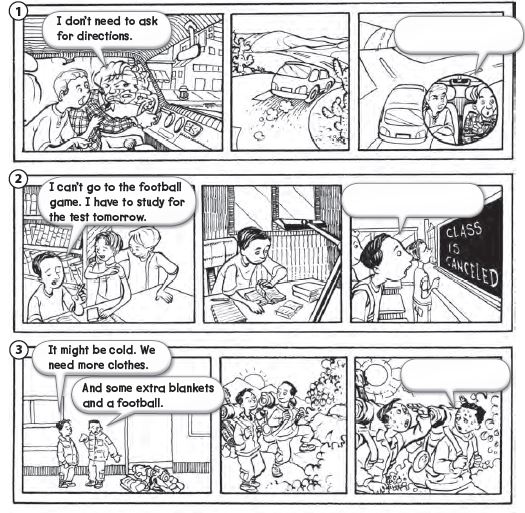للوصول السريع إلى الدروس والاختبارات..
حمل تطبيق سبورة من متجر جوجل

Unit 3: If It Hadn’t Happened
A. Complete the story. Use the words in the box. Put the verbs in their correct form.
- My great-grandparents, Charles and Bessie, moved to the state of Oklahoma in the early 1900s. That was a long time ago!
- Fleming hadn’t even discovered (1) penicillin yet.
- Charles had lost his job. He had been (2) unemployed for months.
- My great-grandparents were looking for a better life in Oklahoma, but life was very hard for them.
- They had very little money. Bessie often thought they shouldn’t have moved to Oklahoma.
- Charles even (3) regretted the move, too. Then one day a man came to town. He talked to Charles about oil.
- He believed he had found a (4) source of it—right under the ground on their farm.
- Bessie thought this stranger was crazy, but Charles listened to him carefully.
- Oil would bring great (5) advantages to their lives. Fortunately, they owned the land, so they could sell the oil rights and make a good life for themselves.
- Days later some men arrived at the farm.
- Bessie stood next to Charles and watched as the men (6) drilled into the ground with their (7) heavy equipment.
- Charles and Bessie were silent. They waited. They watched. Then, suddenly, there were excited shouts from the men.
- A moment later, both Charles and Bessie saw their lives change before their eyes—black oil shot up from the hole in the ground.
- They laughed about it over the years—how crazy Bessie thought Charles was and how worried she was for him. And today that first (8) oil well is still around.
B. Complete the conversation with should have / shouldn’t have + the past participle of the verb in parentheses.
Fahad: I’m so happy you were able to come with us this weekend. We had such fun! But I’m sorry you didn’t participate in the race.
You (1) (be) should have been in the jeep, with us. It was a great race. You’d have enjoyed it.
Qassim: I know. I’m sorry, too. But I (2) (tell) should have told my uncle that I’d broken my leg a few months ago in a bicycle race in the States.
He was worried I might get hurt again and didn’t want me to participate.
Fahad: Oh, but the camel races were out of this world! You were really funny when you lost your balance and ended up hanging from the hump of your camel, I just had to laugh. You (3) (stop) should have stopped her her. You (4) (panic) shouldn't have panicked as you did.
Qassim: You’re right, but I’d never been on a camel before. Horseback riding is different. I know now that I (5) (control) should have controlled her.
I (6) (let) shouldn't have let her realize I was a novice and take advantage of it!
Fahad: Speaking of horses; you (7) (realize) should have realized that you were one of the best riders there. You (8) (win) should have won that race.
Instead, you let Emra beat you. Why?
Qassim: Oh, come on. Emra is a lot older than us. He is our cousin and I didn’t want to upset him. We’d just met.
I want to get to know my cousins, you know, not get them mad at me.
D. Complete each cartoon. Use should have or shouldn’t have + a past participle. Then draw a cartoon of your own. Be sure to use should have or shouldn’t have + a past participle.
- I should have asked for directions.
- I should have gone to the football game.
- we shouldn't have brought all this things.
E. Tell what you would have done in each of the situations in exercise D. Use would have + past participle in your sentences.
1. if / I / drive, / I / ask / for directions
if I had driven. I would have asked for directions.
2. if / my friends / ask / me, / I / go / to the library
If my friends had asked me. I would have gone to the library.
3. if / I / pack / for the trip, / I / take / shorts and T-shirts
If I had packed for the trip, I would have taken shorts and T-shirts.
4. If I had ordered a pizza, I would have only eaten two slices.
G. READING
Does the brain ever sleep? Read the article and find out.
- What is dreaming?
- What causes dreaming?
- Do we dream in colour?
- What does sleep research involve?
I. Choose three items/ regrets from the list in H. Write what the outcome of each action was. Then write sentences with If I had / hadn’t…
- Doing something dangerous/ broke my leg If I hadn't done something dangerous, I wouldn't have broken my leg. Telling someone something I shouldn't
- have/ hurt his/ her feelings and upset him/ her If I hadn't told her anything, her feelings wouldn't have been hurt and she wouldn't have been upset.
- Being mean to a friend/ made me very unpopular If I hadn't been mean to a friend, I wouldn't have become so unpopular.
J. Look at the picture and write as many words as you can about how people benefit from jobs in the oil industry. Write sentences explaining how things would have been different if oil hadn’t been discovered.
| How People Benefit From Jobs in the Oil Industry |
| secure employment, benefits, pay career opportunities, security, housing, education, family, higher standards of living, training opportunities, oil rig |
- If oil hadn’t been discovered, industry wouldn't have developed the way it has.
- If oil hadn’t been discovered, automobiles wouldn't have developed the way they have.
- If oil hadn’t been discovered, number of countries wouldn't have developed into rich nations.
K. WRITING
Write a paragraph about what you regret and why. End the paragraph with a sentence with should have or shouldn’t have as well as a sentence with If I had / hadn’t… Use the organizer to help you take notes and organize your thoughts.
A Regret
- I regret about losing one of the best chances in my life. I got an offer to work as a businessman assistant, but I rejected the offer.
- Now I regret for three reasons. The first reason, the salary was very high. The second, I could travel a lot to many countries.
- The third, the environment of business work is very nice.
- If I had accepted the offer, I would have a very a nice job now.
L. Complete the chart with the correct form of the verb.
| Past Participle | Simple Past | Present |
| appeared | appeared | appear |
| been | was/were | be |
| became | became | become |
| built | built | build |
| cooled | cooled | cool |
| discovered | discover | |
| done | did | do |
| imported | imported | import |
| invented | invented | invent |
| kept | kept | keep |
| made | made | make |
| preserved | preserved | preserve |
| put | put | put |
| used | used | use |
M. Complete the paragraph with the verbs in parentheses. Use the present perfect or simple past tense.
Keep Cool
- People have tried (1. try) to keep cool or keep their food cool for ages.
- The Chinese invented (2. invent) ice cream 4,000 years ago, and they kept (3. keep) it in snow in underground chambers.
- In Baghdad in the eighth century, a king imported (4. import) snow and put (5. put) it in the walls of his summer home to cool the home.
- In 1834, Jacob Perkins built (6. build) a machine to make ice in London.
- The first home refrigerators appeared (7. appear) in the early 1920s.
- Since then, people preserved (8. preserve) their food in refrigerators.
- About the same time, air conditioning of large spaces became (9. become) possible.
- Since that time, people have cooled (10. cool) themselves with air conditioners in stores, offices, and homes.
O. Complete the text with the correct form of be able to. Choose from the box below.
- Since the 1700s, people have tried many different ways of traveling over land. They wanted to
- (1.) be able to move more quickly and more comfortably than they (2.) had been able to on horseback.
- The first car was made in1886 but it was not a perfect design. A hundred years ago, drivers (3.) weren't able to to drive in bad weather.
- Drivers had to get out of their cars and constantly wipe the windshields every few minutes.
- Since M. Anderson invented the windshield wiper in 1903, people (4.) have been able to drive on rainy days much more safely and comfortably.
- Nowadays, manufacturers have improved cars a great deal. They’ve added things that make driving easier such as GPS.
- With a GPS system fitted in your car, you (5.) are able to get to your destination without even looking at a map. Cars have come a long way in one hundred years!
للوصول السريع إلى الدروس والاختبارات..
حمل تطبيق سبورة من متجر جوجل



.JPG)



النقاشات